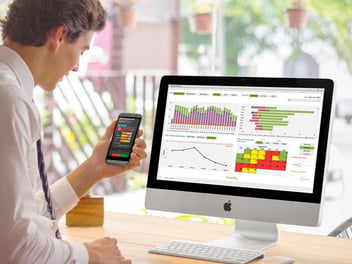Hotel Business Intelligence in Action: Interpreting Booking Pace
Read More
Much is being written these days about “big data” to the point where the term is synonymous for some with “business intelligence.”
In fact, big data is really just BI applied to very large datasets, facilitated by recent quantum leaps in data processing power. These advancements have been brought about in response to the data explosion that is now happening in our daily lives. We are generating volumes of data in almost everything we do, from the sensors in our cars to the social media trail we leave behind.
The travel sector (and our realm in hospitality) is one of the most massive and far-reaching industries on the planet, so naturally it lends itself to the generation of big data. The potential to mine that data for intelligence is certainly there. Indeed that race is already on.
What will be gained from that venture is exciting in its own right, but I would argue that most hoteliers and hotel company executives have much more to gain from turning their attention (and their business intelligence efforts) inward to their own small slice of the big data cake: their own localized datasets.
A Budding Example
As an analogy, imagine that instead of a hotel you operated a flower delivery service. At the level of big data, you and your cohort might be able to better understand trends in the global or regional demand for (or supply of) tulips. You also might observe general trends in the shift of demand across your sector to the largest online delivery services. And you may take note of emerging trends in any number of things (life events, etc.) that impact the flower business.
No question, this is all good information to have. However, the largest impact to your own business would be gained by examining your own dataset, however small it is.
Digging through the data of your own transactions—data generated from those who actually purchased your services (and ideally if available, data from abandoned sales, too)—could be a goldmine for your business, possibly helping you to:
- learn that where you place an arrangement on your website greatly impacts its sales;
- uncover commonalities in the geographic distribution of your business that lead you to focus more (or less) on placing advertising into certain locations; and
- notice more clearly how customers are reaching you (phone, website, storefront, etc.) or how they aren’t reaching you, allowing you to make adjustments accordingly.
Hotel Application
It’s a small step to translate this flower delivery example to the business of hotels, where our own localized datasets often are not fully explored and exploited to grow the business.
There are many reasons for this, ranging from a lack of knowledge of business intelligence in general to a lack of data management strength and/or business process challenges that compromise the quality of the dataset. It takes a disciplined and thoughtful approach to lay the proper foundation for impactful business intelligence.
For hoteliers, this requires thinking through the entire booking cycle for all of the different market segments from which they derive business.
Key is considering up front how you will be able to distinguish bookings and the different attributes of bookings from within your dataset. For instance, the ability to accurately identify the country of residence of all guests will depend upon the business processes in place within the reservations department and at the front desk to capture that information.
Similarly, being able to accurately identify the selling channel of a booking requires an understanding of the distribution process and the configuration of the systems involved in that process. Further to such key data management considerations, how data will be extracted and analyzed for the hotel’s benefit also must be considered in order to effectively leverage business intelligence.
To be clear, big data versus localized datasets doesn’t have to be an either/or proposition. There is clearly benefit to be gained from both.
I would argue the question is more one of immediacy and necessity—that localized datasets are the cake and that big data is the icing.
Perspective matters as well. Within some larger hotel companies I have observed a microcosm of the big data phenomenon, whereby the company’s BI expenditure and focus was all on gleaning trends from the company’s dataset as a whole to better understand how to market the brand. In this case, the company’s overall data is the “big data,” and the business unit (hotel-level) data remain the “localized datasets” (which in these cases were non-existent or ignored).
On the whole, ours is a highly decentralized business. The challenge at hand is to operationalize business intelligence by placing it into the hands of decision makers at the hotel level and directing its use toward the growth of their business units. After all, this is where any hotel company’s profits are made (or lost).





Comments